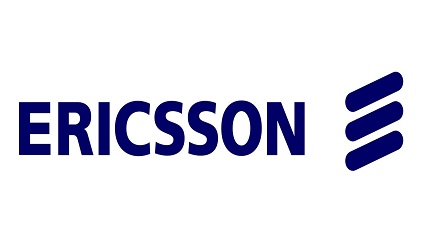Telecom
Ericsson Reports Mobile Subscriptions in Africa Near Billion Mark

The latest edition of the Ericsson Mobility Report, a comprehensive update on mobile trends leveraging big data from live networks worldwide, reveals that proliferation of mobile technology continues at a rapid pace: Africa has topped 880 million in mobile subscriptions for Q3 2014.
The report shows that 90 percent of the world’s population over six years old is predicted to have a mobile phone by 2020.
Furthermore, by 2020 smartphone subscriptions are forecast to top 6.1 billion.
Ericsson also predicts that 85 percent of Middle East and Africa mobile subscriptions will be 3G/4G by 2020.
Fredrik Jejdling, president & regional head of Ericsson sub-Saharan Africa said: “The increased availability of low-cost smartphones in sub-Saharan Africa will lead to a rapid increase of smartphone subscriptions in the region.However, GSM/EDGE-only subscriptions will remain the most common subscription type for the next five years due to the high numbers of lower income consumers using2G-enabled handsets.”
Smartphone penetration: 800 million new subscriptions in 2014
Smartphone growth continues as 65-70 percent of all phones sold in the third quarter of 2014 were smartphones, compared with 55 percent in the same quarter for 2013.
Despite this increased rate of sales, which will see the addition of an estimated 800 million new smartphone subscriptions by the end of 2014, the report finds there is still plenty of room for growth in the sector.
Smartphones currently account for just 37 percent of all mobile phone subscriptions, meaning that many users have yet to make the switch to the more feature-rich, internet-friendly option.
The report predicts a strong uptake in the coming years as the number rises from 2.7 billion smartphone subscriptions today to the forecasted6.1 billion in 2020.
Video: Largest And Fastest Growing Segment Of Mobile Data Traffic
Video continues to dominate mobile networks: in 4G-dominatednetworks it currently constitutes 45-55 percent of mobile traffic, driven largely by increased usage of video streaming and improvements in the mobile video experience.
Video is increasingly appearing as part of other online applications such as news and adverts, and on social media platforms.
At the same time, growth in video streaming is being driven by access to over-the-top (OTT) services and content, such as those provided by YouTube.
Devices used to watch video are also evolving.
Many have larger screens, enabling higher picture quality for streamed video, which results in video being consumed on all types of devices and in higher quantities, both at home and on the move.
In terms of future outlook, Ericsson estimates that mobile video traffic will increase tenfold by 2020, ultimately constituting around 55 percent of all mobile data traffic in 2020.
5G: Subscriptions On The Horizon
5G is expected to be commercially deployed in 2020, and the technology is predicted to have a faster uptake than 4G LTE, just as 4G had a faster uptake than 3G.
The difference here is that, in addition to new radio technologies, 5G will also encompass evolved versions of existing radio access (such as 3G and 4G), cloud, and core technologies to cater for the thousands of new ways that mobile technology will be used. 5G growth will be driven to a large extent by new use cases, especially in machine-type communications.
This is the seventh issue of the Ericsson Mobility Report, which shares forecast data, analysis and insight into traffic, subscriptions, and consumer behavior to provide insight into current traffic and market trends.
Ericsson regularly performs traffic measurements in over 100 live networks in all major regions of the world.
Detailed measurements are made in a selected number of commercial WCDMA/HSPAand LTE networks with the purpose of discovering different traffic patterns.
The forecast period for the latest report has been updated to cover the period from 2014-2020.
Telecom
Layer3 Wins Big at African Beacon of ICT Awards 2025

Layer3 Limited, One of Nigeria’s foremost ICT solutions providers, has once again solidified its place as a trailblazer in Africa’s technology landscape, emerging as the Enterprise Solutions Provider of the Year and Leadership Award in Cloud Services at the prestigious African Beacon of ICT Leadership and Awards held on May 24, 2025, at the Four Points by Sheraton, Lagos.

This year’s event brought together leading tech innovators, policymakers, and thought leaders to recognize organizations making extraordinary contributions to Africa’s digital transformation.
Among the many luminaries in attendance, Layer3 stood out for its 19+ years of consistent innovation, technical excellence, and client-centered service delivery.
Speaking at the event, the organizers praised Layer3’s pioneering work in delivering robust enterprise solutions across sectors, as well as its bold leadership in advancing cloud infrastructure and services across Nigeria and beyond.
“These awards are more than recognitions, they are a reminder of the fulfilment to our mission to deliver peace of mind to our customers,” said David Ita, the Head of Strategy and Business Development of Layer3.
“They speak to the impact we’ve made and the promise we hold for the future of the cloud and enterprise technology business in Africa. We dedicate this honor to our clients, partners, and the hardworking Layer3 team who continue to redefine excellence every day.”
Since its founding, Layer3 has championed a future-forward approach to ICT services offering cutting-edge solutions in enterprise networking, cybersecurity, broadband, cloud computing, managed services, and IT advisory. The company’s Layer3Cloud platform and managed service offerings continue to power the digital ambitions of Nigeria’s leading businesses.
These accolades underscore Layer3’s unwavering commitment to driving transformation and supporting digital economies through smart, secure, and scalable technology.
Telecom
eBusiness Life Girls In ICT: Stakeholders Call For More Action On Girls Participation In ICT

After 13 years of organizing the Girls in ICT Day celebration, a campaign that seeks to mentor young girls to develop interest in STEM (Science, Technology, Engineering and Mathematics); and seek careers in information and Communications Technology (ICT), stakeholders that gathered for the 13th edition which recently held in Lagos, has applauded the successes recorded in Nigeria.

The stakeholders, who also noted that more work need to be put in, further disclosed the need to have young girls ascribing for roles in ICT as a means of guarding their future and contributing to the growth of all sectors in the economy.
Speaking in her opening remark, Convener and CEO of eBusiness Life Communication Limited, organisers of the campaign, which had girls from 10 different schools in and around Lagos State and corporates from the ICT industry in attendance, Mrs. Ufuoma Emuophedaro noted that calls and letters from participating students from past editions of the event are testaments to the impact the campaign is having on Nigerian girls.
“From this very platform, we have been able to raise a lot of girls. Some of them are already working. I have received a good number of mails from them thanking me for how that helped them change their perceptions, and they are now studying ICT-related causes. The numbers are getting better and it will continue to get better. We will continue to do this campaign to see it getting better,” Mrs. Daro disclosed.
“We cannot gather all the girls in Nigeria in one room, but there is a need to spread the news, even as we are streaming this activity live on YouTube and Instagram.”
Reeling out the figures, she quoted an ITU statistics that showed the progress made, disclosing that since its inception in 2011, there has been 377,000 girls and young women taking up careers in ICT and 11,400 celebrations in over 171 countries. It is not just in Nigeria, but all over the world.
While encouraging the girls to change the stereotype that bequeaths ICT careers to boys, she noted the abysmal statistics that need to change. “While women make up about 47% of the global workforce, they are underrepresented in STEM. Just 3% of students joining ICT courses globally are women.”
This year, the theme, ‘Girls in ICTs: Bridging ALL Divides for an Inclusive Digital Transformation’, underscores the need not just to participate, but to lead the world in digital transformation.
Mrs. Emuophedaro called on corporate bodies, governments and other stakeholders to create a conducive environment and an inclusive tech space for girls everywhere.
She also charged the girls to believe in themselves and take up the challenge.
“Do girls use technology? Yes! But that is not all we want. Apart from using, we want them to create technology. Also no matter what sector you are in, you need to have some in-depth knowledge of technology. “
In her global message Secretary General of the International Telecommunications Union (ITU), Doreen Bogdan-Martin noted that ITU is committed to empowering 100 million girls with digital stills and called on partnerships to achieve this.
She stated: “We celebrate the power and potentials of girls and young women as leaders, creators and change-makers in the digital age. 189 fewer women than men are using the internet in 2024. That is too many missed opportunities to learn.”
She encouraged governments and corporate organisations to support the campaign to build a crop of girls of the future.
Also speaking at the event, Vertical Head, High Net-worth Individuals, Globacom, Adeboye Adeniji, noted that Globacom that believes in the power of Nigeria’s talents, especially the amazing potentials in young, vibrant, brilliant and beautiful girls.
“We live in a world powered by technology, from the phones we use, to the Apps we love, to the networks that connect us, for example, Globacom. ICT is everywhere. You belong in that world, you are the future, not just as users, but as leaders, creators and innovators,” she encouraged the girls.
She further noted that when girls have the tools, the training and the confidence, there is no limit to what they can achieve. “Whether you dream of becoming a Software Engineer, a Robotic Expert, a cyber-security Analyst, or even the next big tech CEO, everything is possible. Don’t let anyone tell you tech is only for boys. That is simply not true.
You are smart and smart enough to work in tech, to build your own tech company. You are strong enough, and you have every right to dream as big as you want. So, keep learning, stay curious, ask questions, and never be afraid to try. Because the future of technology isn’t just built in Labs and Boardrooms, it is being built here in classrooms like yours. From all of us in Globacom, we believe in you, we support you, and we can’t wait to see how you change the world.”
In her presentation, Head, Cybersecurity & Compliance Advisory, Digital Encode, Bisola Oladejo, encouraged the girls to stay on top of any career path they may choose, and to research the available options in the field of ICT, as there are so many career paths in ICT.
Speaking on why girls matter in ICT, she said they bring uniqueness and colour, making Apps interesting.
She also noted that ICT is important to girls because it affords and empowers them with skills, opportunities and confidence to thrive in a digital world, breaking gender barriers and unlocking social and economic potentials.
Oladejo however noted the root causes of low female participation in ICT to include, limited STEM education in schools; social media distraction; low funding, lack of adequate access to internet and ICT gadgets; gender bias from families; cyber-bullying, among others.
She called on governments to formulate deliberate initiatives that target female inclusivity in ICT, and to partner with NGOs and ease private sector initiatives.
The event saw the girls compete in STEM Quiz competition, Robot programming competition and Students’ Roundtable, winning prices and receiving gifts from the organisers.
Also, Awards were also giving to two deserving women in ICT – Funmilola Victoria Omojola (ICT Touch Holder Award) and Dr. Nihinlola Mary Fafore (ICT Advocacy Award).
The International Girls in ICT Day is an initiative of the International Telecommunications Union (ITU) that seeks to bridge the gender divide in ICT related careers by encouraging girls to build a foundation that will position them in tech-related jobs of the future.
Telecom
MTN inducted into Brand Africa Hall of Fame

MTN Group has been inducted into the inaugural Brand Africa Hall of Fame “in recognition of its transformational impact on African consumers and its role in shaping a positive African narrative”. MTN was also recognised as the #1 Most Admired African Brand Contributing to a Better Africa; the #1 Most Admired African Brand (spontaneous recall); the #1 Most Admired Brand Doing Good for Society and the Environment; and #1 Most Admired Telecommunications Brand.

The Hall of Fame honour, introduced this year by Brand Africa, acknowledges brands that have demonstrated sustained excellence and influence on the continent over the past decade. MTN’s induction reflects its ongoing commitment to enabling digital access, expanding financial inclusion, and contributing meaningfully to Africa’s development.
The announcement was made alongside the release of the 2025 edition of the Brand Africa 100 rankings – an annual, independently conducted survey spanning more than 30 African countries and representing more than 85% of the continent’s population and GDP.
“It is an honour to be inducted into the Brand Africa Hall of Fame and to be named the most admired African brand contributing to a better Africa, the most admired African brand by spontaneous recall, as well as the brand most admired for doing good for society and the environment,” said Ralph Mupita, MTN Group President and CEO.
“That this recognition comes during Africa Month gives it added significance. It reflects the progress we continue to make as a continent and the role trusted brands must play in advancing inclusive, digitally enabled growth. We are grateful for the confidence placed in MTN by the people we serve and remain committed to delivering meaningful impact.”
Mupita also acknowledged the collective effort behind the brand’s success, thanking MTNers, partners, and other stakeholders across the continent for their role in making this recognition possible.
MTN operates mobile networks in 16 countries. Since 2021, the company has been guided by its Ambition 2025 strategic intent of Leading digital solutions for Africa’s progress. This underscores MTN’s commitment to driving digital and financial inclusion and fostering innovation across the continent.
Further validating its brand leadership, MTN was recently ranked once again as South Africa’s most valuable brand. The accolade was made in the 2025 Brand Finance Top 100 Report, which accorded MTN a brand valuation of R50.7 billion. MTN has held this position every year since the survey’s inception in 2012.

 Telecom2 days ago
Telecom2 days agoTelecom Subscribers Decline By 43m in One Year

 E-Business2 days ago
E-Business2 days agoNigeria Launches Cybercrime Team with Commonwealth, UK Support

 E-Financial2 days ago
E-Financial2 days agoSERAP Drags CBN to Court over Alleged Failure to Disclose LG Allocations

 Telecom2 days ago
Telecom2 days agoNCC Orders Telcos to Compensate Subscribers for Outages More than 24 Hours

 General News2 days ago
General News2 days agoHEDA Sues FG, Oil Giants over Alleged Unlawful Oil Licence Transfer

 Telecom2 days ago
Telecom2 days agoIHS Nigeria, NSCDC Partner to Protect Telecoms Infrastructure

 Telecom1 day ago
Telecom1 day agoEngr. Ikechukwu Nnamani Receives Two Prestigious @ABoICT Awards

 E-Financial1 day ago
E-Financial1 day agoEFCC Recovers over N20Bn Stolen by Hackers from 6 Banks in Nigeria




























